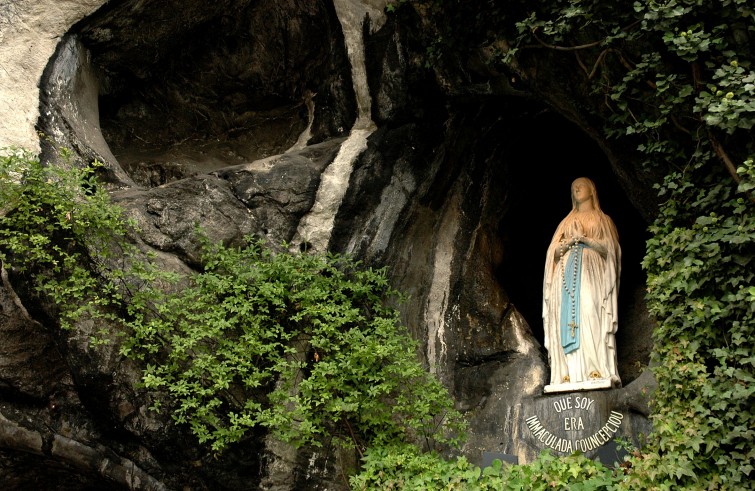
No busy calendar of celebrations and initiatives, no visiting by the sick. This year, the Feast of Our Lady of Lourdes, on 11th February, will be celebrated in the French shrine only with an international Mass and the morning Rosary before the image of the Blessed Virgin Mary, in the Massabielle Grotto. The lockdown starting 6pm does not permit the presence of the faithful at the evening Rosary or torchlight procession. But prayers shall continue. Msgr. Olivier Ribadeau Dumas, Rector of the Lourdes Shrine, describes the atmosphere amidst the lanes of the shrine and in places of worship during this time of pandemic, with precautionary measures in place against COVID-19. Follows his interview with SIR.
 How will you be celebrating the Feast of Our Lady of Lourdes this year?
How will you be celebrating the Feast of Our Lady of Lourdes this year?
In an unusual way, as people are only allowed into the shrine to attend religious services, namely the International Mass and the Rosary prayer. But pilgrims will be unable to pray at the Grotto after dawn, since the curfew starts at 6 p.m.
However, this day is important for several reasons: it’s the World Day of Prayer for the Sick, and the sick are very much revered in Lourdes. John Paul II decided to dedicate the date of the feast of Our Lady of Lourdes to this event. Lastly, because this is a place of healing, but it is also a place where the poor and the sick come first.
Doctors are at the heart of your online meetings lately. Why?
I think it’s extremely important to offer them a special thought, to tell them that it might be possible for them to return to Lourdes, since those who fell sick will be the first to receive the vaccine. We put in place a detailed health card with instructions that will allow people to visit the shrine in full safety.
Have you made plans for a possible resumption of pilgrimages?
It’s hard to say when we will finally return to normality, the situation is unpredictable. We hope to resume the first pilgrimages at the beginning of July, since the effects of the vaccinations could be seen around that time. We are hoping there will be many pilgrimages by the end of October. And some even in June.
Even if the sick should not be permitted to come, healthcare workers will, and they will bring the prayers of those who are ill.
You will pray for the sick and for healthcare workers…
Indeed. We pray for them frequently. We pray for all those who are caring for the most vulnerable: physicians, the nurses working with them. We need people who put themselves at the service of their brothers and sisters. As Christians, we have a special duty to pray and put ourselves at the service of our fellow others.
What assessment can be made of this year in Lourdes, marked by the pandemic?
It has been a trying year. We were faced with three challenges. The first is uncertainty. We are not used to uncertainty. We are used to knowing what we have to do. But now we don’t know what we are going to do tomorrow or the day after. In Lourdes, we are used to placing our trust in pilgrims. Uncertainty is met with trust by pilgrims. We were also confronted with vulnerability. The myth of the young and handsome does not apply.
Lourdes reminds us that the most vulnerable come first and that vulnerability has immense dignity. It also teaches us that the answer to the challenge of vulnerability lies in brotherhood, in solidarity, which is what we experience in Lourdes.
The third challenge, in reviewing a year of pandemic and crisis, is that of having to confront death. Our Western societies have cast death out of life. But now death is prominent, every evening we must reckon with the daily death toll. But we are not afraid of death, for we know that thereafter there is the communion of the sons and daughters with the Father. Hence, for us, death must not be feared as something terrible.
What is your message for this year’s Day of the Sick?
I think that the crisis we are going through prompts us to reflect on a number of extremely important aspects. It is an invitation to trust in the future and in others. It is an invitation to turn our gaze to our neighbour. The greatest danger is to be afraid of others. Instead, we must extend a helping hand to our fellow human beings.












